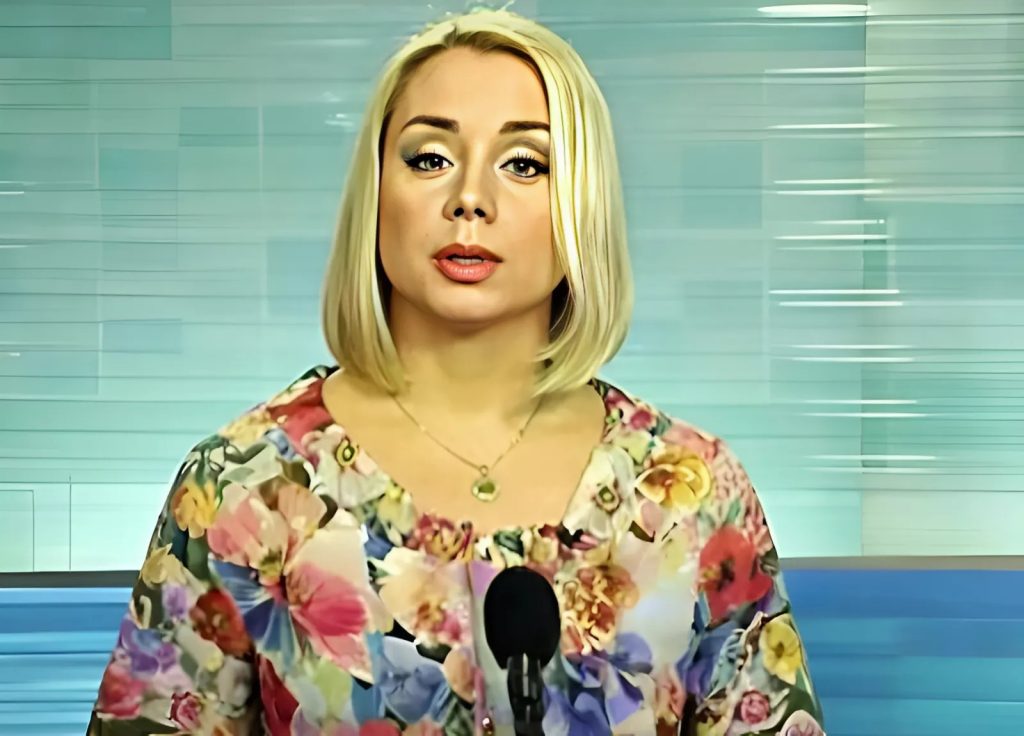It was supposed to be just another morning. News headlines, studio lights, the familiar rhythm of a national broadcast. The anchor — known for her poise and professionalism — stepped into the studio early, as she always did, with a calm expression and a folder of scripts in hand. Producers adjusted microphones, cameras locked into position, countdown began.
No one knew that this would be the broadcast that would stop the country in its tracks.
The program opened as scheduled. Weather update. Traffic alerts. Political roundups. The anchor’s voice was steady, composed — the same voice that had guided viewers through hundreds of broadcasts. Then came a segment marked “breaking news.”
The screen cut to footage from a rural village engulfed in smoke. A fire the night before had destroyed several homes. One fatality had been confirmed.
And that was when everything changed.
The Moment That Changed Everything
Without warning, the anchor removed her earpiece and slowly stood up. She stepped away from the teleprompter and looked directly into the camera.
— “I’m sorry. I can’t do this anymore,” she said.
At first, producers thought her microphone had glitched. But it hadn’t.

— “Every day, we sit here and read numbers. One dead. Three injured. Dozens displaced. And then we move on to the exchange rate and the weather forecast. But behind every number is a face, a name, a family. And somehow, we’ve all gotten used to pretending it doesn’t matter.”
Silence fell in the control room.
— “I’m not just a voice reading lines. I’m a person. And if we don’t feel something — anything — when tragedy hits our neighbors, then what exactly are we becoming?”
She paused. Her hands were steady. Her voice never shook.
— “This will be my last broadcast. Not because I don’t love journalism, but because I refuse to deliver tragedy like it’s a grocery list. If you’re watching, I beg you — don’t turn your empathy off. Don’t become desensitized. Because the moment we stop caring, we stop being human.”
She calmly removed her microphone, placed it on the desk, and walked off screen.
The broadcast cut to an emergency placeholder graphic. But the damage — or the awakening — had already begun.
Shockwaves Across the Country
The footage of her emotional stand went viral within hours. On every platform — social media, news outlets, public forums — her speech was dissected, praised, criticized, shared.
Some called her unprofessional. Others called her a hero.
But something deeper was happening. For once, the audience wasn’t just discussing what happened. They were questioning why it resonated so deeply. Why were people so shaken by a woman simply choosing to feel?
And the truth was undeniable: because we had all stopped feeling.
Who Is She?
Her name was Anna Vetrova. Age 38. Nearly 15 years in national television. Respected, calm, apolitical. The kind of journalist people trusted precisely because she never lost composure.
Until the day she chose to.
Shortly after the broadcast, she submitted her resignation. No interviews. No statements. Just a short message posted online:
“I chose truth over silence. And heart over format.”
She disappeared from the media spotlight the same way she had entered it years ago — with quiet grace.
The Conversation That Followed
In the days that followed, something remarkable happened. Journalists from other networks wrote open letters. Firefighters, nurses, teachers began sharing their own moments of emotional burnout. Posts with the hashtag #IStillFeel flooded social media.
People began to talk not just about the anchor’s action, but about themselves. Their own numbness. Their own fear of caring too much. Her words had tapped into something raw — a collective exhaustion with acting like nothing affects us anymore.
It wasn’t just a media moment. It was a societal mirror.
What Happens Next?
Nobody knows if Anna Vetrova will return to journalism. Maybe she won’t. Maybe she’ll write. Maybe she’ll teach. Or maybe she’ll simply live a quieter life, having said what needed to be said.
But one thing is certain: that live broadcast will not be forgotten.
Not because it was dramatic.
Not because it broke protocol.
But because it reminded a nation that even in an age of headlines and data points, it is still possible — and sometimes necessary — to speak from the soul.
And sometimes, the most radical act of journalism… is simply choosing to be human.
